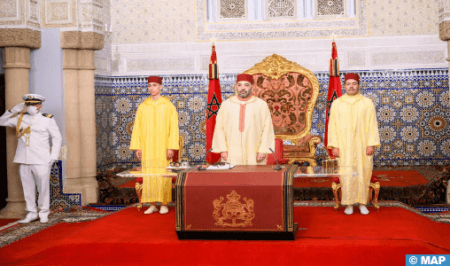
King of Morocco, King Mohammed IV has called on its traditional partners as well as new ones, “whose stances concerning the Moroccanness of the Sahara are ambiguous, to clarify their positions and reconsider them in a manner that leaves no room for doubt.”
In a speech to mark the nation’s 69th anniversary of the revolution of the King and the People, King Mohammed IV applauded all the countries that have declared their support for Morocco and urged the rest to do same.
The King said “a number of influential states have expressed support for the Autonomy Initiative within Morocco’s full sovereignty over its territory as the only solution to this artificial regional dispute”.
“The firm position of the United States of America has been a source of real motivation – a position that is not affected by a change of Administration, nor is it influenced by new circumstances”.
“I also commend the clear, responsible stance of Spain, our neighbour that is well aware of the origins and the reality of the dispute.
“This positive stance has paved the way for a new chapter in the Moroccan-Spanish partnership – a chapter that is not affected by regional circumstances or by domestic political developments.
“The constructive position regarding the Autonomy Initiative adopted by a number of European countries – which include Germany, the Netherlands, Portugal, Serbia, Hungary, Cyprus and Romania – will contribute to ushering in a new era of trust-based relations, and will help strengthen the qualitative partnership with these friendly countries.
“At the same time, nearly thirty countries have opened consulates in our southern provinces, thereby confirming their clear support for the Kingdom’s territorial integrity and the Moroccanness of the Sahara.
“I should like, in this regard, to express my appreciation to my brothers the Kings, Emirs and Presidents of Arab sister nations, particularly those of Jordan, the United Arab Emirates, Djibouti and the Comoro Islands, which have opened consulates in Laayoune and Dakhla.
“I also wish to extend my thanks to the other Arab countries which have consistently confirmed their support for the Moroccanness of the Sahara, especially the Gulf Cooperation Council States, Egypt and Yemen.
“In the same vein, I should like to say how much I value the position adopted by our brothers in Africa; approximately 40% of African countries from five regional groups have opened consulates in Laayoune and Dakhla.
“This dynamic trend also includes countries from Latin America and the Caribbean, as a number of states from those regions have opened consulates in the Moroccan Sahara, while others have chosen to extend their consulate jurisdiction to cover the Kingdom’s southern provinces as well.
“With these positive developments in mind – which concern states from all continents – I should like to send out a clear message to everyone: the Sahara issue is the lens through which Morocco looks at the world. It is the clear, simple benchmark whereby my country measures the sincerity of friendships and the efficiency of partnerships.
“I therefore expect certain states among Morocco’s traditional partners as well as new ones, whose stances concerning the Moroccanness of the Sahara are ambiguous, to clarify their positions and reconsider them in a manner that leaves no room for doubt.”
In his speech, His Majesty stressed that defending the Moroccanness of the Sahara is a pivotal element uniting the domestic front and the full mobilization of all Moroccans – wherever they may be – to confront the plots of the enemies.
Hence, the King took the opportunity to “salute and commend the members of the Moroccan expatriate community, who spare no effort to defend our territorial integrity on various platforms and in different venues”.
“Morocco, by the grace of the Almighty, has an expatriate community of about five million people, in addition to hundreds of thousands of Moroccan Jews around the world”.
“Moroccans abroad are quite special in that they are deeply attached to the homeland and strongly committed to the nation’s immutable values. They are also keen to serve their country’s best interests, notwithstanding the problems and hardships they are facing”.
According to His Majesty, “the firm human bonds as well as the pride taken in belonging to Morocco are not limited to first-generation immigrants. They are passed on, from one generation to the next, up to the third and fourth generations”.
As for the expatriate community’s involvement in the country’s development, the King pointed out that “Morocco needs all its sons and daughters today. It needs all the skills and expertise of the Moroccan community abroad, either to reside and work in Morocco, or to engage in different partnerships, from the country of residence”.
“The Moroccan community abroad is known for its members’ excellent skills and proficiency in various scientific, economic, political, cultural, sport and other sectors. This is, indeed, a source of pride for Morocco and all Moroccans”.
For the Monarch, it’s time to create the right conditions and to give the Moroccan community the means to benefit from the support they need, in order to give the best of them and thus contribute to the development of their country.
In This case, the King “insisted on the need to create a lasting structural connexion with Moroccan experts and talents abroad, including Moroccan Jews”.
His Majesty also called for “the creation of a special mechanism to be tasked with accompanying these Moroccan experts and talents abroad and supporting their initiatives and projects”.
“This will make it possible to identify expatriate Moroccans with competencies, to stay in touch with them on a continuous basis, and to inform them of their country’s potential, including the current development and investment dynamic”.
Finally, and given the aspirations of the Moroccan community abroad, the King of Morocco said “the time has come to modernize and upgrade the institutional framework governing these cherished citizens”.
“What is more, the governance model of the existing institutions should be reconsidered with a view to enhancing efficiency and complementarity”.

